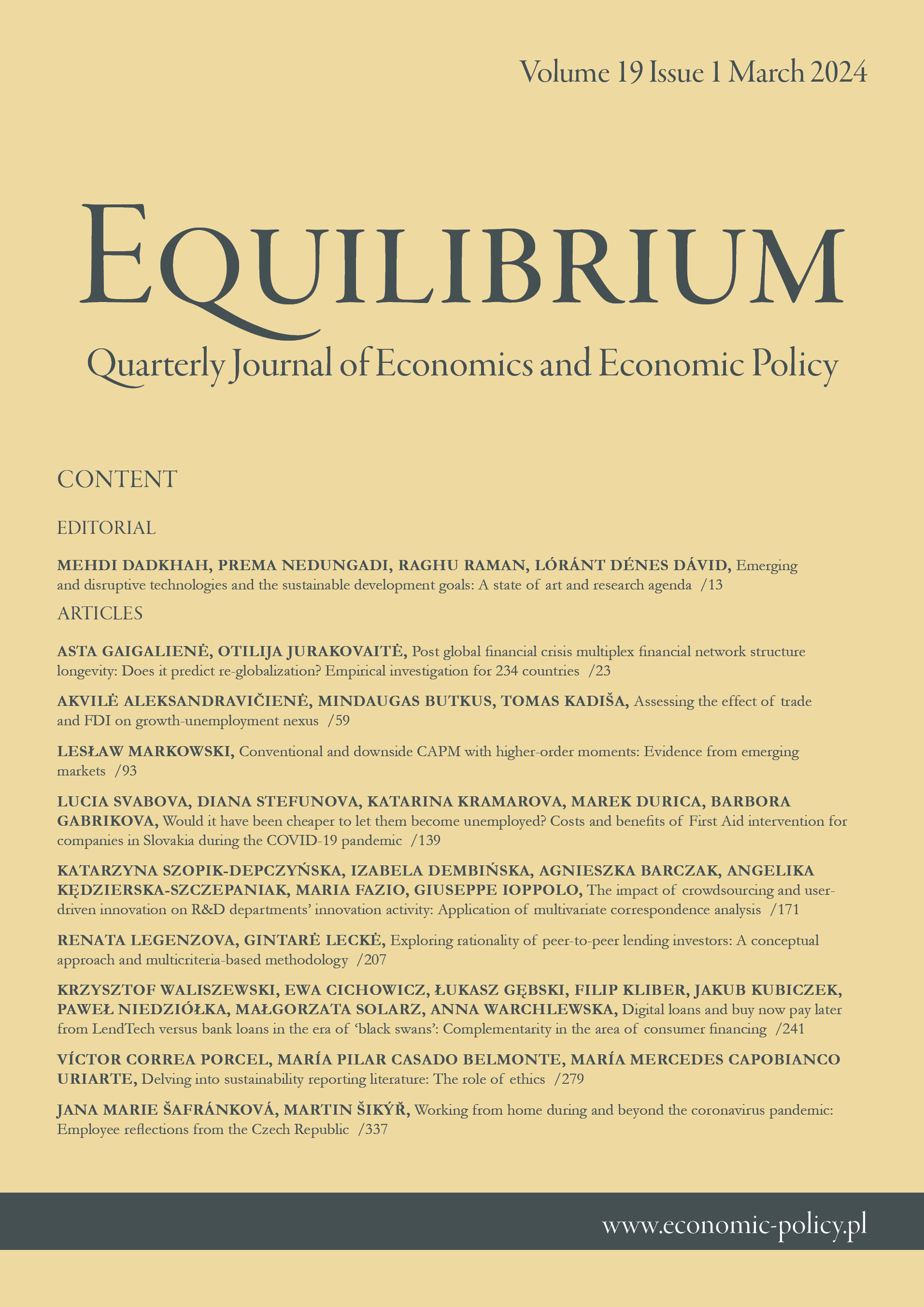商业银行对新冠肺炎大流行危机的抵抗力:以波兰为例
IF 6.2
Q1 ECONOMICS
Equilibrium-Quarterly Journal of Economics and Economic Policy
Pub Date : 2020-06-24
DOI:10.24136/eq.2020.010
引用次数: 90
摘要
研究背景:分析可以评估信贷组合的行业结构对商业银行抵御COVID-19大流行造成的危机的影响。它使用两种独立的方法来衡量大流行对行业风险的影响,以及允许根据危机的潜在负面影响对行业进行优先排序的方法。文章的目的:研究的目的是评估在波兰银行业经营的商业银行对COVID-19大流行造成的潜在影响的抵御能力。选取13家商业银行的诊断特征进行实施。方法:采用Hellwig法和TOPSIS法两种线性排序方法。以下指标被用作商业银行弹性参数评估的标准:资本充足率、流动性水平、业务活动的盈利能力、已确认减值的风险敞口在投资组合中的份额以及银行信贷组合对经济部门风险敞口产生的风险的弹性。根据与COVID-19大流行造成的危机影响相关的风险水平,对这些部门进行了分类。研究结果和附加价值:该研究得出结论,在波兰开展业务的大型银行对疫情后果的抵抗力最强。与此同时,受危机影响最脆弱的银行也得到了确认。这些结论可用于管理金融系统稳定风险的过程,并有助于讨论疫情对新兴市场商业银行状况的影响。本文章由计算机程序翻译,如有差异,请以英文原文为准。
Resistance of commercial banks to the crisis caused by the COVID-19 pandemic: the case of Poland
Research background: The analysis allows to assess the impact of the industry structure of the credit portfolio on the resistance of commercial banks to the crisis resulting from the COVID-19 pandemic. It uses two independent methods to measure the impact of the pandemic on industry risk and the methodology allowing to prioritize industries in terms of potential negative effects of the crisis. Purpose of the article: The aim of the research is to assess the resilience of commercial banks operating in the Polish banking sector to the potential effects caused by the COVID-19 pandemic. The diagnostic features of 13 commercial banks were selected for its implementation. Methods: Two linear ordering methods were used, namely the Hellwig method and the TOPSIS method. The following were used as the criteria for parametric assessment of the resilience of commercial banks: capital adequacy, liquidity level, profitability of business activity, share in the portfolio of exposures with recognized impairment and the resilience of the bank's credit portfolio to the risk resulting from the exposure in economic sectors. These sectors were classified according to the level of risk associated with the effects of the crisis caused by the COVID-19 pandemic. Findings & Value added: The study allows to conclude that the largest banks conducting their operations in Poland are the most resistant ones to the consequences of the pandemic. At the same time, the banks most vulnerable due to the crisis were identified. The conclusions can be used, inter alia, in the process of managing the financial system stability risk and contribute to the discussion on the impact of the pandemic on the condition of commercial banks in emerging markets.
求助全文
通过发布文献求助,成功后即可免费获取论文全文。
去求助
来源期刊
CiteScore
9.20
自引率
3.50%
发文量
28
审稿时长
36 weeks
期刊介绍:
Equilibrium. Quarterly Journal of Economics and Economic Policy is a scientific journal dedicated to economics, which is the result of close cooperation between the Instytut Badań Gospodarczych/Institute of Economic Research (Poland) and Polish Economic Society and leading European universities. The journal constitutes a platform for exchange of views of the scientific community, as well as reflects the current status and trends of world science and economy.
The journal especially welcome empirical articles making use of quantitative methods in: Macroeconomics and Monetary Economics, International Economics, Financial Economics and Banking, Public Economics, Business Economics, Labor and Demographic Economics, Economic Development, and Technological Change, and Growth.
Current most preferable topics and special issues:
The economics of artificial intelligence: business potentials and risks;
Digitalization and entrepreneurship in economics;
Sustainable socio-economic development, environmental and ecological economics;
Transition in the energy market (improving energy efficiency, alternative energy sources, renewable energy, energy security).

 求助内容:
求助内容: 应助结果提醒方式:
应助结果提醒方式:


